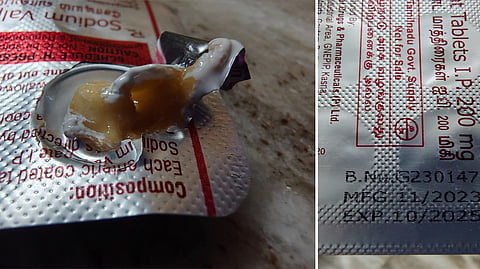

CHENNAI: For her seven-year-old child, Nivetha (name changed) regularly purchases an antiepileptic -- sodium valproate (200 mg) tablets -- from the Institute of Child Health and Hospital for Children in Egmore.
Two to three tablets in every strip were always in a viscous state. Worried, she wrote to Tamil Nadu Medical Services Corporation (TNMSC) a few months ago.
TNMSC, which procures and supplies drugs to all government hospitals, immediately issued a “stop-issue-cum-retrieve” order to all the warehouses for the particular batch of the medicine. However, the issue persisted even after getting the same drug from a different manufacturer. Meanwhile, TNMSC is awaiting the laboratory results on the samples of the batch of medicine flagged by Nivetha.
Subsequent enquiries by the TNIE shed light on the potential root cause of the issue -- lack of air-conditioning and other temperature-monitoring systems at TNMSC warehouses and GH pharmacies. Several pharmacists told TNIE that it was not an isolated incident. Despite warehouses having 120-200-sq ft walk-in cold storage facilities and Ice-lined Refrigerators (ILRs), the problem appears to be with those drugs stored at room temperature, which is prescribed to be between 25 and 30 degree Celsius.
None of the 32 drug warehouses or GH pharmacies across the state are air-conditioned. Two Chennai warehouses that the TNIE visited did not have air-conditioning or other temperature-control measures in place. An official from the State Drug Control Department said air conditioners are not mandatory, as per The Drugs and Cosmetics Rules. However, the department has been advising on mandatory air conditioning before issuing licences to pharmacies. The pharmacies in government hospitals are given an exemption since no sales is involved, the official added.
Advising against taking tablets in a liquified state, a government doctor said not just heat, but moisture during the rainy season could also affect the efficacy of the tablets. However, tablets that are disintegrated would not lose their effectiveness.
A few years ago, the Kerala government made efforts to air-condition the pharmacies at government hospitals. A senior Kerala government official said almost all pharmacies in the state, even those at the Primary Health Centres, are now air-conditioned.
A senior TNMSC official told TNIE that their warehouses were huge facilities and that air-conditioning them would be expensive. However, he said, the TNMSC does not compromise on medicine quality. Only those that pass the quality control checks are distributed, he said, also acknowledging occasional complaints from companies regarding issues due to storage.
‘Drug rules do not mandate air-conditioning’
Speaking to TNIE, Health Secretary Supriya Sahu said while Rule 64 of the Drugs and Cosmetic Rules mandates the licensing authority to get satisfied with respect to storage conditions, no specific requirements of air-conditioning are mandated.
She said, the same rule, however, specifies four different categories of temperature requirements -- cold condition (2 to 8 degrees), cool storage (10 to 25 degrees), capsules to be stored at 30 degree Celsius, and at room temperature.
To satisfy the above, she said the warehouses are equipped with walk-in coolers and ILRs.